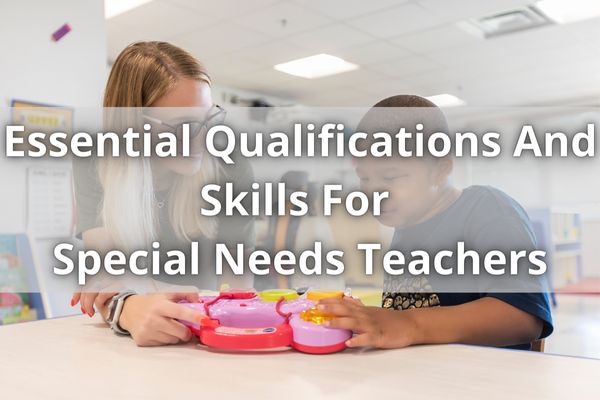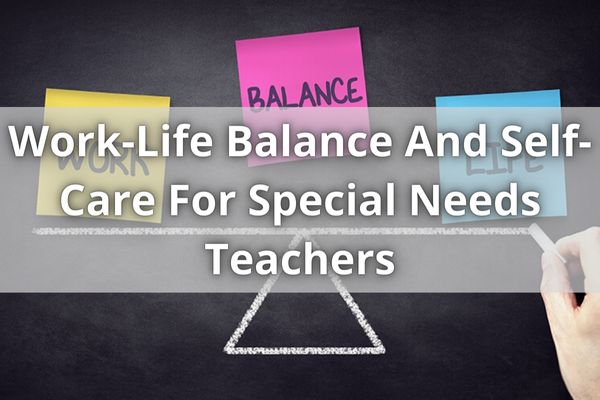Special Needs Teaching Careers: Skills, Strategies, And Tips
I’m sure you’ve heard of teaching, but have you ever considered special needs teaching careers? For both the teacher and their pupils, it may be a really fulfilling experience. It is feasible to significantly improve the lives of persons who require more assistance with the correct knowledge and abilities.
In this piece, we’ll go over what it takes to be a successful special needs teacher and why it could be the best option for your long-term career goals.
Introduction
Educating kids with special needs can be tremendously fulfilling, and in today’s society, it’s more crucial than ever. Aspiring special needs teachers often have many questions they need answered before they embark on their career journey.
I’m here to provide you a thorough breakdown of what is required to succeed in this industry so that you can decide if this is the appropriate path for you.
The most important thing when teaching special needs students is understanding how the individual student learns best, as each person has unique strengths and weaknesses. It’s also essential to stay up-to-date with the latest techniques and strategies for working with these students. Additionally, having strong communication skills will help immensely when interacting with parents and other members of the educational team involved in helping your student reach success.
With proper preparation and knowledge, anyone interested in this amazing field can create meaningful change in the lives of their students!
Understanding Special Needs Education
As a special needs teacher, it’s important to understand the different elements of special needs education. It encompasses many aspects that include creating an inclusive classroom environment and providing appropriate instruction for students with disabilities or other special needs.
Here are some key points about special needs education:
- It is based on the idea that all children should receive equal access to quality educational opportunities regardless of any differences they may have.
- Specialized instruction must be tailored to meet each student’s individual learning style and abilities in order for them to succeed.
- Teachers need to be well versed in various teaching techniques such as differentiated instruction, behavior management strategies, and collaborative problem solving skills.
- Inclusive settings require collaboration between teachers, parents, administrators, and peers in order to ensure effective support systems are established for every student.
Having a deep understanding of these concepts will help you become more successful when working with students who have special needs. With this knowledge you can better provide personalized instruction and create an encouraging atmosphere where every learner feels included and valued.
Legislation And Policies In Special Needs Education
Understanding the laws and rules that support special needs education is crucial for special needs teachers. The Individualized Education Programs (IEPs) and 504 plans, which offer guidelines for fulfilling the specialized educational requirements of students with disabilities, are also crucial to be familiar with.
IEPs are legal documents developed by teams of educators, parents/guardians, and other service providers outlining appropriate goals for each student based on their specific disabilities. Meanwhile, 504 plans are designed to ensure that all students receive equal access to quality education in accordance with federal civil rights laws.
In my role as a special needs teacher, I’m responsible for implementing these policies while advocating for compliance among school staff members who may not understand or agree with them. This means educating others about what our roles entail when working with students with special needs so they can better understand why certain accommodations need to be made.
It also necessitates that I keep up with any modifications to legislation or policy pertaining to special needs education so that we may guarantee that everyone is aware of the most recent facts and instructions.
Essential Qualifications And Skills For Special Needs Teachers

In order to succeed as a special needs teacher, I must possess a set of credentials and abilities.
The first and most important qualification is an appropriate educational background. Depending on where you teach, this may involve completing post-secondary education or specialized training programs related to teaching students with disabilities. In addition, many jurisdictions require that teachers be certified by the state or other governing body in order to work as a special needs teacher.
My success also depends on having key skills for working with disabled students. This includes being patient and empathetic when dealing with challenging behaviors, excellent communication skills so I can build positive relationships with parents and colleagues, problem-solving abilities to adapt lessons to meet individual student’s needs, and teamwork so I can collaborate effectively with other professionals involved in my students’ care.
With these essential qualifications and skills, I am confident that I will be able to provide quality instruction to all of my special needs students.
Strategies And Approaches In Special Needs Teaching
Understanding the methods and practices that can make learning accessible to all children is crucial for special needs teachers. Whether you’re dealing with them one-on-one or in a classroom setting, there are a number of crucial considerations to make while educating children with special needs.
- Firstly, differentiated instruction and universal design for learning allow you to tailor your lesson plans to meet the individual requirements of each student.
- Secondly, assistive technology is an invaluable tool when creating engaging activities tailored to different abilities; it allows teachers to present information in multiple formats and provide alternative ways for students to interact with material.
- Additionally, developing positive behavioral management techniques and using positive reinforcement helps foster a supportive environment where every student feels respected and included.
- Finally, building strong collaborative relationships with other professionals involved in their care is paramount in providing effective support for students with special needs.
Exploring Various Special Needs Teaching Careers
You have the exceptional chance to enable kids and adults with learning difficulties to realize their full potential as a special needs teacher.
There are many different career paths available in this field, from teaching classes in public or private schools to providing one-on-one tutoring or home-based services.
You could even work as a consultant or advocate for special education programs, or provide virtual teaching and online resources through non-profit organizations and community centers. Whatever road you take, it is incredibly satisfying to know that you are improving someone else’s life on a daily basis. It’s crucial to thoroughly consider all of your alternatives if you want to become a special needs teacher.
In order to choose the choice that best matches your abilities and interests, be careful to grasp the educational requirements for each sort of career.
With the right preparation and dedication, being a special needs teacher can be incredibly rewarding – both personally and professionally!
Tips For Building A Successful Special Needs Teaching Career
Making the decision to pursue a career in special needs teaching is an exciting and challenging journey. Now that you have explored various options, it’s time to start building your successful career as a special needs teacher. Here are some tips for getting started:
- Networking and professional development: Attend conferences and workshops, join special education associations and groups, stay updated with the latest research and trends.
- Building a strong resume and portfolio: Create an impressive CV or résumé showing off your qualifications, experience, certifications, etc. Additionally, build up your portfolio by adding documents such as lesson plans and student work samples that demonstrate your capabilities as a special needs teacher.
- Navigating job interviews and demonstrations: Prepare for all types of job interview questions related to special needs teaching, be prepared to answer any technical questions about working with students who have disabilities during live demos or mock classes.
- Seeking mentorship and support from experienced professionals: Connect with mentors who have already established careers in this field. Seek advice on how to navigate through different situations in the classroom as well as other aspects of the profession.
- Staying motivated throughout the process: Celebrate each success along the way no matter how small they may seem; use them as motivation when times get tough. Also remember that taking care of yourself mentally and physically is just as important!
From here you can begin applying these strategies towards achieving your goals within this rewarding field — whether it’s finding meaningful employment opportunities or honing your craft further by enrolling in advanced courses or pursuing additional certifications. You will go one step closer to being a skilled special needs teacher through hard work and commitment.
Work-Life Balance And Self-Care For Special Needs Teachers

Being your best self for the sake of your pupils is crucial, as a special needs teacher you already know. But oftentimes, this means putting aside our own wellbeing in order to provide the necessary care and attention for those we are teaching.
Unfortunately, this can lead to burnout and stress if not managed properly – but with some intentional effort, you can create balance between work-life and prioritize taking care of yourself too!
The first step is recognizing when things may be getting out of balance. If you start feeling overwhelmed or stressed during your day, take a moment to pause and reflect on what might be causing these feelings.
It’s also helpful to check in regularly with yourself about how well you’re managing job challenges and workload. Once you become aware of any imbalance, it’s time to implement practices into your routine that help restore balance such as setting boundaries around your availability so that nothing becomes overwhelming or unmanageable.
Additionally, make sure you find ways to practice self-care by doing activities like exercising, meditating, reading books or listening to music which helps reduce stress levels significantly.
Finally, don’t forget to reach out for support from colleagues and join professional groups where fellow teachers offer valuable advice or just listen without judgment – both are equally beneficial!
The Impact And Rewards Of Special Needs Teaching Careers
I’m sure that any special needs teacher will tell you that their career is immensely rewarding.
Every day, I get to work with students who need extra help and support in order to reach their fullest potential. It’s incredible how far they can come when given the right tools and assistance. The relationships I develop with my students and colleagues are so meaningful; it truly feels like we’re all working together towards a common goal.
The rewards of this profession go beyond just academic success for the students; seeing them become more confident in themselves brings me great joy as well. Knowing that I have been part of helping these amazing kids grow into capable young adults is incredibly fulfilling.
Teaching special needs children requires immense patience and dedication, but the payoff is tremendous!
Conclusion
There is no greater reward than making a difference in the lives of students with special needs. As an aspiring special needs teacher, you have already taken the first step towards achieving your goal – recognizing that teaching these students requires more than just knowledge and skill. It also requires passion, dedication, compassion and empathy for those who need it most. With commitment to this cause, comes great rewards such as helping shape young minds and enriching the lives of others.
You can be confident that if you are brave enough to pursue this noble career path, not only will you make a lasting impact on the lives of countless individuals but you will also get immense personal satisfaction from knowing that your efforts have helped someone reach their full potential or even exceed it.
So don’t let fear or uncertainty stand in your way; take advantage of every opportunity presented to you so that one day soon, you too can experience firsthand what it truly means to be an effective special needs teacher.







